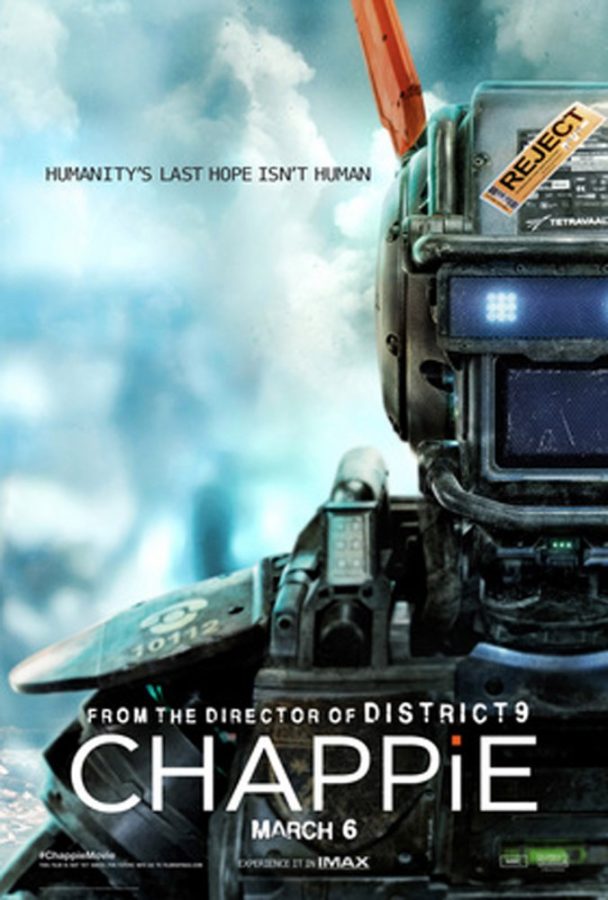It’s 2016 in South Africa’s largest city, Johannesburg, and crime is rampant. The police have enlisted armored, bipedal robot guards, called Scouts, to work alongside law enforcement. This is good news for Tetravaal, the company that produces the robots, and Deon Wilson (Dev Patel), the robot’s designer, who is also working on a side project of his own: a firmware update for consciousness.
His workplace rival is Vincent, played by a mulleted Hugh Jackman, who is vehemently against artificial intelligence. He’s a half-baked villain, never getting much characterization outside of his religious opposition to A.I.
Deon successfully develops his consciousness program, but the head of Tetravaal, Michelle Bradley (Sigourney Weaver), idiotically has no interest in real A.I. Inexplicably, Bradley does not see the potential and thinks it would only produce a sentient being that would have opinions on art. With no other recourse, Deon steals away a Scout that’s been decommissioned to test out his program. This coincides with a couple of down-on-their-luck gangsters who kidnap Deon.
Ninja and Yolandi Visser of Die Antwoord, a Cape Town group whose appeal has gone international over the past half-decade for their outlandish songs, personas and music videos, star in the film as characters of the same names. It’s not mentioned in the film that they belong to a famous, real-life group, yet they wear sweatshirts that are emblazoned with their names and “Die Antwoord.” It’s fun, and a little weird, how pervasive their presence is in the movie.
The two, with their reinterpretations of the mullet and overall weirdness, have the perfect look for Neill Blomkamp’s characteristic, gritty Johannesburg ghetto, first seen in the director’s 2009 film “District 9.” His first feature-length outing, after over five years and two more films, remains the director’s best work, far and away.
Ninja and Yolandi need to pull a heist to pay off another gangster. They abduct Deon, thinking that he would have a catch-all remote to switch off the police robots. He doesn’t, but he has the next best thing: a stolen robot in his trunk. The consciousness program is successfully uploaded, and Chappie is born.
Well, “he” doesn’t come into the world as “Chappie.” It’s his christened name given to him by Yolandi. Despite Deon’s protestations that his creation, arguably one of the most important in the history of man, is going to be called something as flippant as “Chappie,” the fledgling robot happily takes to his name. This is a fair summation of the main conflict.
Though he develops at an accelerated rate, Chappie still begins with the mind of a child. He is extremely malleable, ready to take after whatever example is put in front of him. As Chappie’s creator, Deon wants him to live up to his full potential. Ninja wants Chappie as his personal “robot gangster No. 1.” Yolandi is stuck in the middle, taking on the role of Chappie’s sympathetic, caring “mommy.”
The risk with “CHAPPiE” is that most of the heavy lifting, in terms of exposition and emotion, is carried out by a South African rap-rave duo and a CG robot. It’s safe to say that the trio is hardly the most stable acting foundation for a feature film.
Yet, extremely surprisingly, it works for the most part.
At times, it’s apparent that Ninja and Yolandi are simply reciting lines. Their charisma and sincerity compensates for the occasional lack in acting finesse, if one remembers that they’re not really actors. Yolandi, particularly, is impressive in displaying a soft, nurturing nature.
Sharlto Copley, Blomkamp’s mainstay in both “District 9” and “Elysium,” voices the robot. His effective voice work, combined with physical mannerisms, transforms Chappie into a quirky, vulnerable little guy.
Like his previous works, Blomkamp’s latest film climaxes in action and violence, putting whatever intriguing ideological concepts it originally addressed — such as consciousness and life itself — on the back burner. There are revelations at the end that approach transcendence but don’t feel earned, like they did at the conclusion of “District 9.”
Like the character himself, there’s a good heart underneath the clunky, physical trappings in “CHAPPiE.”
Grade: B-
_______________
Follow Alex Guyton on Twitter.









